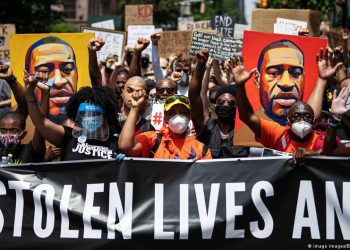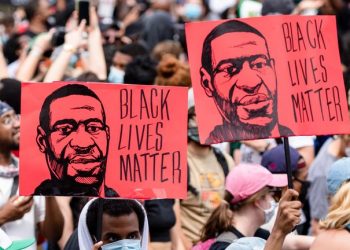Human Lives Human Rights: “I can’t breathe” were the words that George Floyd repeated more than 20 times while a white Minneapolis police officer unjustly murdered him.
The resonance of these words not only triggered a global outcry against violence inflicted on Black communities; it also propagated recollections of similar experiences of oppression within Black communities.
In a similar vein, this article shares ‘deepened social inequality’ faced by Black community due to COVID-19 lockdowns in the UK.
Researchers at the University of Oxford, U.K., used data from the first eight waves of the U.K. Household Longitudinal Survey on COVID-19 — from March 2020 to March 2021. They also used data from the main survey of two waves before the pandemic — from 2017 to 2019.
The panel survey covers a representative sample of 51,000 adults from approximately 40,000 households. The researchers reached out to individuals aged 20–65 years who participated in the main study to ask them to join the COVID-19 supplementary study. This required monthly online reporting from April 2020. In May 2020, the researchers added the option to report by telephone.
In total, nearly 16,000 individuals responded, representing a 42% response rate.
The authors reviewed the impact of COVID-19 and COVID-19-induced measures as the surveyed population reported.
The researchers were especially interested in how income, their use of time, and their well-being changed throughout different stages of the pandemic. In addition, they wanted to determine if these factors varied based on the sex, ethnicity, and education level of those surveyed.
Many of the measures officials implemented to contain the spread of COVID-19 involved reducing physical contact between people. As a result, the first wave of lockdowns impacted global social behavior immediately.
For example, business closures and remote work altered working patterns. Countries that introduced lockdown measures, such as the U.K., Australia, and the United States, immediately recorded reductions in work earnings.
Studies conducted following the first U.K. lockdown indicated that women and parents experienced a more negative influence on their subjective well-being than that of other social groups. Black, Asian, and minority ethnic immigrants were also more likely to have experienced economic hardship.
“So often, we focus just on cases and hospitalization, ICU usage, and mortality numbers, but it’s important to also look at the social impacts,” said Richard M. Carpiano, Ph.D., in an interview with Medical News Today.
Carpiano is a public and population health scientist and a medical sociologist. “A pandemic is very much a sociological phenomenon as much as it is the spread of a virus.”
Impacts of later lockdowns
As more lockdowns occurred, people’s health and overall feeling of well-being changed, not only because of the possibility or actuality of contracting SARS-CoV-2 but also because of related worry and stress.
The study showed that at the start of the pandemic, individuals who worked experienced a reduction in average earnings and the hours they worked per week. In addition, there was an increase in distress levels.
Data indicates that the mental health of most U.K. adults returned to pre-pandemic levels after the first lockdown, but that was not true for everyone.
Another study that appears in The Lancet supports this observation. It showed that 1 in 9 people did not experience an improvement in their mental health once the first lockdown lifted.
These lingering lockdown effects differed across the sexes, ethnicities, and between degree and nondegree holders. For example, during the first lockdown, the decline in pay was smaller for female than for male workers, possibly because of a higher proportion of women working in key sectors. Later, however, paid work time for men recovered faster than that for women.
Initially, the subjective well-being experienced by women suffered more than that of men. Then, as women’s subjective well-being began to recover, men’s distress levels began to rise.
Regarding earnings, Black, Asian, and marginalized ethnic people were more negatively affected than white individuals. This earnings gap persisted after easing lockdown restrictions.
The researchers conclude that the long-lasting pandemic and related restrictions have produced persistent negative consequences for earnings, work patterns, and subjective well-being.
Author Muzhi Zhou spoke with MNT about the study:
“Some changes in social inequality seem to disappear once lockdown measures are lifted, while other changes remain persistent throughout the whole year. It is worrying to see that the deepened social inequality could be long term for certain social groups.”
The study concludes by noting, “The negative impacts of the spread of COVID-19 and its related measures vary not only in their extent but also in their speed among different social groups.”
The authors suggest further research to understand the factors that have driven and exacerbated these social inequalities. To stress their point, they quote poet Damian Barr: “We are in the same storm, but we are not all in the same boat.”
Speaking about future research, Zhou told MNT: “I think that given the richness of this continuing dataset and the growing number of people contracting [SARS-CoV-2], it is time to examine whether positive and negative COVID-19 test results have different impacts on people of different social groups. Moreover, whether people respond and behave differently after they have taken the vaccine is another very interesting topic.”


















I don’t commonly comment but I gotta tell thankyou for the post on this perfect one : D.
I just like the helpful information you provide in your articles
I am truly thankful to the owner of this web site who has shared this fantastic piece of writing at at this place.
very informative articles or reviews at this time.
Nice post. I learn something totally new and challenging on websites